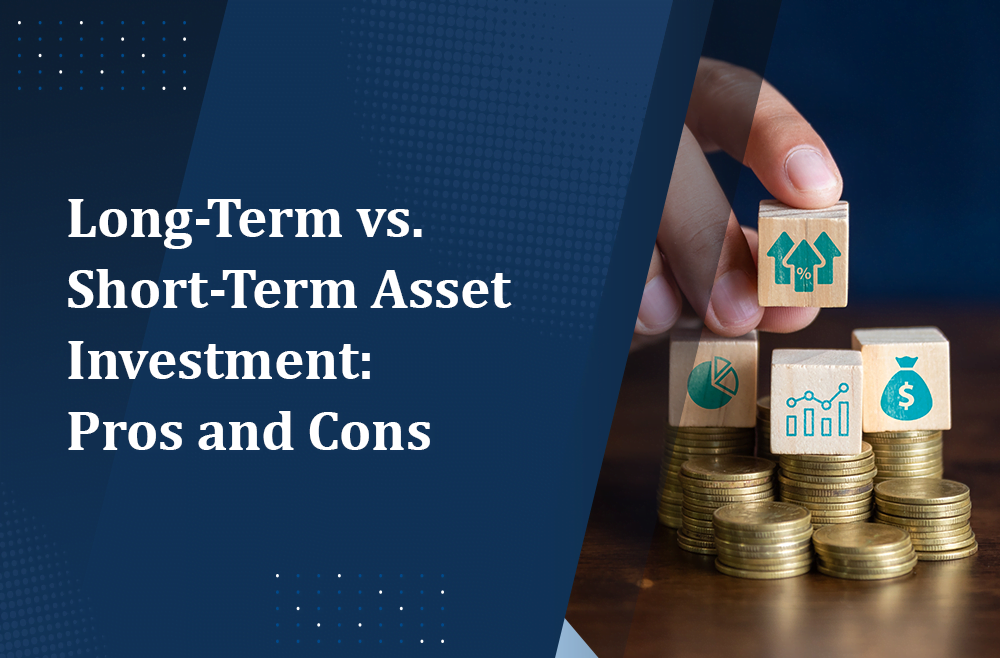When it comes to investment decisions, one of the most important things you’ll make is whether to go for long-term or short-term asset investments.
Short-term investments are typically those that last for less than a year, while long-term investments are those that last for several years, often upwards of a decade. Every investor’s situation is unique and you should consider your investment goals, risk tolerance, and time horizon before making any investment.
In this article, we’ll take a closer look at the pros and cons of investing in short-term and long-term assets.
Pros of Short-Term Investments
1. Quick Returns
One of the biggest advantages of short-term investments is the quick returns you can achieve. If you invest in a stock or bond, it can take a long time to see any profit, but investing in short-term assets like options and futures can give you quick wins.
2. Liquidity
Short-term investments are normally easily converted into cash, making them a potentially great option if you need quick cash for an emergency or other investments.
3. More Control
Since most short-term investments only last for a few months or less, you typically have more control over your funds and can make changes or switch investments easily.
Cons of Short-Term Investments
1. Higher Risk
Short-term investments are often more volatile than long-term investments, which means they are riskier. A sudden market drop or a bad financial decision can result in significant losses.
2. Lower ROI
The returns on short-term investments are typically lower than on long-term investments. Short-term investments usually have higher fees and expenses, which eat into the potential profits.
Pros of Long-Term Investments
1. Compound Interest
Long-term investments have more time to grow and can benefit from compound interest, which means you can earn more over time.
2. Lower Risk
Long-term investments are typically less volatile than short-term investments, which means you are less likely to lose significant amounts of money.
3. Tax Benefits
Long-term investments often come with tax benefits, which means you can keep more of your profits.
Cons of Long-Term Investments
1. Less Control
Since long-term investments require you to commit your funds for an extended period, you may have less control over those funds.
2. No Quick Wins
Long-term investments can take several years to start seeing any returns.
3. Losses Can Be Significant
While long-term investments are less volatile, it doesn’t mean you can’t lose money.
While both short-term and long-term investments have their pros and cons, the ultimate decision comes down to your financial goals and preferences. If you need quick cash and have a high-risk tolerance, short-term investments may be a good fit. On the other hand, if you’re looking for long-term growth and stability, long-term investments should be the way to go.
Regardless of the investment you choose, it’s always advisable to consult a financial advisor before making any decisions. Talking to a professional can help you navigate complex investment options and develop a strategy that suits your needs.
Work with us
If you are looking for a financial advisor, schedule a consultation with Cold Harbor Financial! Our team is committed to proactively addressing the needs of our clients and building loyal and long-term relationships with them. We have been providing a high level of professional guidance and personal client service since 1990.
Let’s explore the potential of working together!
Opinions expressed in the attached article are those of the author and are not necessarily those of Raymond James. All opinions are as of this date and are subject to change without notice. This material is being provided for information purposes only and is not a complete description, nor is it a recommendation. There is no guarantee that these statements, opinions, or forecasts provided herein will prove to be correct.
All investments are subject to risk, including loss. There is no assurance that any investment strategy will be successful. Asset allocation and diversification does not ensure a profit or protect against a loss. It is important to review the investment objectives, risk tolerance, tax objectives and liquidity needs before choosing an investment style or manager.
Please note, that changes in tax laws or regulations may occur at any time and could substantially impact your situation. While familiar with the tax provisions of the issues presented herein, Raymond James Financial Advisors are not qualified to render advice on tax or legal matters. You should discuss any tax or legal matters with the appropriate professional.
Investments mentioned may not be suitable for all investors.






